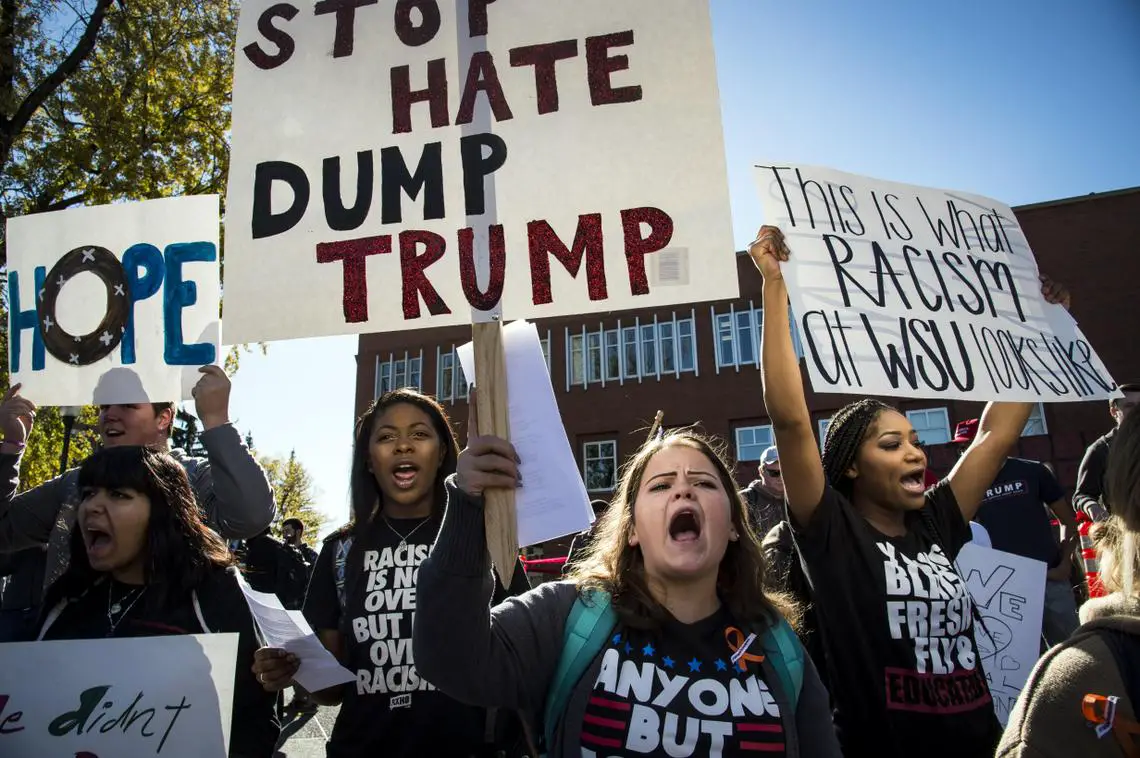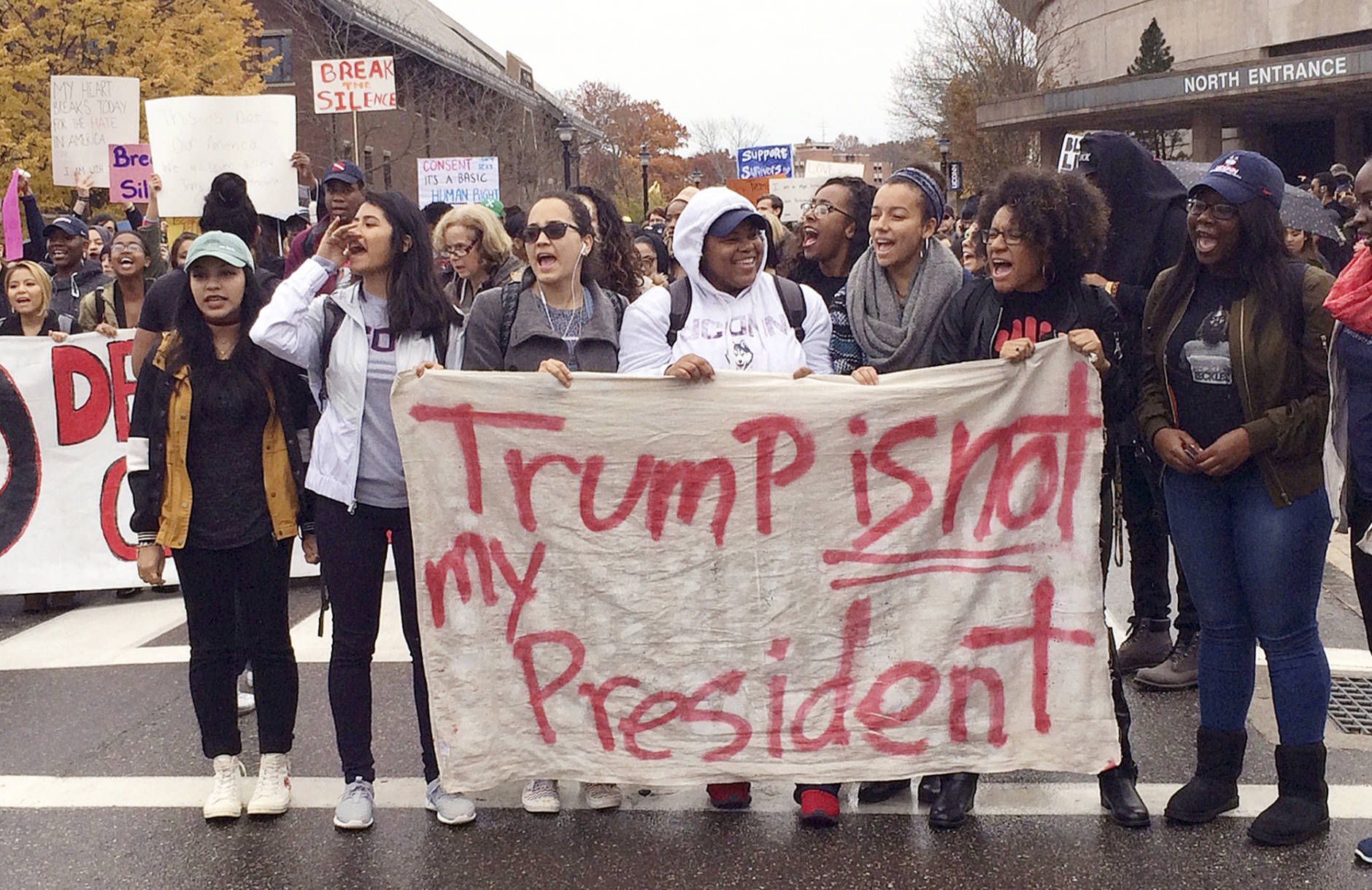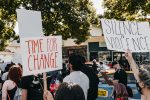Violence Is Not the Answer to Political Disagreement
College campuses have always been centers of discourse and respectful debate, but has the outcome of this election altered that trait forever?
By Maria Alvarado, Savannah College of Arts and Design
Last Tuesday night, as the final results of the presidential election became more obvious, I watched my Facebook dashboard fill with posts expressing acceptance, fear, surprise and bewilderment.
Even people who didn’t comment or post about the elections in the past months suddenly seemed pretty eager to express their standpoint. At first there was nothing wrong with the Facebook statuses claiming to support or abhor the new President of the United States. However, as the night progressed, the posts became long rants, wannabe manifestos and indirect remarks seeking to hurt and humiliate people who disagreed. It seemed like it was going to be a never-ending war on social media.
By midnight, there were already posts calling on people to protest and rebel against the U.S. government and Trump supporters. At the same time, pictures of people celebrating and defacing private property with Nazi symbols and racists messages surfaced on different websites.
In my medium-sized, liberal arts college campus, things looked good in comparison to the outrage and jubilation other colleges showed on Snapchat. The dorms were in deep silence, and even people who allegedly voted for Trump retreated to their own rooms to watch TV in peace.
Yet, things were not as serene as they first seemed.
By Wednesday morning, I ran into the first heated argument I’ve encountered as I went into a local Starbucks. A guy was screaming in his friend’s face, red with anger, blaming him for “ruining the country” and “never taking things seriously.” His friend stood up from the table, pushed him and screamed that he was a “hipster good for nothing with any idea of how politics work.” They were asked to leave.
I went into the college library, convinced that it would be a more appropriate place to hang out. But, as I approached the tables where people usually sit to study or read in silence, I noticed the giggles that came from a corner. Two girls were sitting together, making jokes that were winning them quite a few annoyed looks from fellow students around them.
“We’re making America great again, Sarah! Who needs a college degree now? Heck, now that Trump is going to deport all the immigrants, I don’t even have to worry about finding a job anymore!” said one of the girls before bursting into loud laughter. At a neighboring table, two Asian boys stared at each other and spoke just as loudly in their native languages. And, though I have no knowledge of Asian languages, the tone of their voices told me they were not happy with the girls’ jokes.
I went back home, confident that at least there I would find some peace. Yet, even in my own apartment I found that my three roommates, two of whom voted for Trump and one of whom voted for Hillary, repelled each other and avoided having long conversations. Though there was no arguing, the tension suffocated the life out of our tiny kitchen to the point where we ended up going to our own rooms to eat dinner alone.
Finally, our usually friendly and tolerant campus had turned into another post-election battleground. What started as a conflict between political sides on Facebook spiraled out of control and caused college campuses all around the country to feel like unsafe places—not only because of how inevitable it is to disagree, but also because people don’t know how to hold a conversation without wanting to reach for each other’s throat.
Whether someone is a Trump supporter or not, it doesn’t matter. Everyone deserves respect, and no one should feel like the place where they live is forcing them to pick a side. In college campuses, students are supposed to grow and express their own way of thinking. As a community, a college is supposed to grant the opportunity for people to build connections and learn together. However, speaking out loud about their political views is one of the least things college students want to do at this time. Many people avoid talking about the elections and the new President of America because they don’t want to start an argument.

It is easy to get carried away and feel angered when someone defies what seems to be the best choice or the right thing to do for the country. Still, it is important to remember that other people don’t necessarily have to agree with the same point of view. At times it is very tempting to try to explain to others why they are wrong, but is forcing political views on others really fair? Isn’t cutting into the freedom of speech the outcome that everybody feared?
In addition, as if dealing with the tension in the classroom and dormitories wasn’t enough, college students also have to deal with the groups of horrible people who go around harassing them. Several news websites have posted videos, images and stories of African Americans, members of the LGTBQ community and international, immigrant-descendants who have been harassed and harmed by people who are crazy enough to think they suddenly have the right to “purge” the country. They move around college campuses feeling they have the power to do as they please, a thought merely founded on their deep, deep, deep racism, xenophobia and homophobia.
As a result, many colleges have warned their students to avoid walking alone and approaching individuals who look like they are way too eager to argue. Members of the LGTBQ community and other student associations who support diversity have also posted messages or put up posters giving important information and advice to keep safe. And though knowing the number of your school’s student security station is never useless, it’s still sad to see that college communities are no longer the welcoming and safe places they were about two weeks ago.
The elections have left behind a clear division in the country. Sadly, this division means that many friendships and connections will be broken. It means that people have to be extremely careful with what they say and with whom they open up. It shows that all the speech classes and workshops in the world can’t teach us how to properly discuss politics.
But what can we do to revert the effect of the presidential election? First of all, stop blaming Hillary Clinton, Donald Trump and “the liberals” for your lack of conversational skills. Engage in tolerant and open discussions, express yourself, listen to other people’s opinion and be nice. Avoid people who aren’t reasonable, don’t join the spirit of confrontation and run around painting walls and breaking car windows. Violence should never be a vehicle for opinion. The only way to take our campuses back from the hands of the post-election syndrome is to move forward together.

















